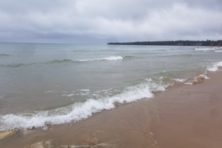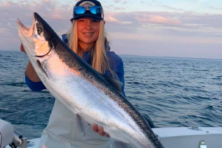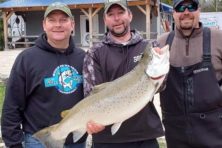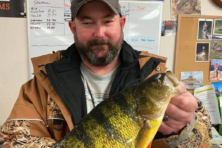Wild Things: Perch, Pike, Trout and ’Eyes
- Share
- Tweet
- Pin
- Share
Whitefish not the only game in town
Ice anglers have a smorgasbord of species to choose from when heading out onto the frozen waters of Green Bay. A terrific deep-water fishery for whitefish is the focus of many trips, but they’re certainly not the only possible catch.
If you don’t mind sorting through smaller ones, there’s been enough of a perch resurgence during recent years to make setting tip-ups and jigging for yellow-bellies worth a shot again.
A smaller but passionate contingent of anglers likes to fish for larger predators such as northern pike, walleye and brown trout. Shallow and deep weeds hold pike, while reefs and Northern Door harbors lure all species.
Arctic-like air has finally firmed up most favored fishing holes, and there’s no thaw in sight in the 10-day forecast. Get the latest advice at bayside bait-and-tackle shops. Experienced anglers know ice conditions and access sites, and they can suggest some of the best baits and depths to try.
Fish are cruising the bay waters from Dyckesville to Washington Island. Pick a spot, drop your bait and wait. If you still come up short, there’s always the local fish market.
Bird-watching Weekend
This weekend is the 24th annual Great Backyard Bird Count, a fun opportunity to join thousands of people around the world in counting the species you spot. Scientists use the eyes of participants to collect information about where the birds are, including how many and what species.
During last year’s event, participants from more than 100 countries set a record by submitting nearly 250,000 checklists online, identifying nearly 7,000 of the world’s estimated 10,000 bird species.
This year there’s a new way to send in an observation: through the Cornell Lab’s free Merlin Bird ID app. As in the past, using the eBird platform on a mobile app and computer also works.
National Audubon Society scientist Chad Wilsey said participants contribute valuable data, and in return, studies indicate that pausing to observe birds, their sounds and their movements improves human health.
Interested in taking part in the Great Backyard Bird Count? Visit birdcount.org.
Sturgeon Spearing
The Department of Natural Resources (DNR) has been reporting fairly clear water on Lake Winnebago and the upriver lakes, which should lead to good success when the sturgeon-spearing season opens Feb. 13. In addition, this past week’s Arctic-like cold has greatly improved ice conditions on the lakes.
Sturgeon spearing is something you have to plan for. Licenses for Lake Winnebago must be purchased by Oct. 31 of each year, and upriver lottery licenses must be applied for by Aug. 1. The season will run up to 16 days, or until any of the harvest caps are met.
Because of the pandemic, registration stations will be operated as drive-through only. Spearers will be required to remain in their vehicle throughout the process.
Guide Meeting Feb. 17
The DNR is holding a virtual public meeting Feb. 17, 6 pm, to gather input on proposed new rules for guides operating on the Great Lakes. Members of the public can access the meeting beginning at 5:45 pm via Zoom or by calling 929.205.6099 and using meeting ID 85289533642#.
The DNR will discuss new developments to help clarify who must report, when reports must be filed and proposed changes to the reporting method.
Guided-trip information is an important supplement to creel survey data. Guided trips generally have a greater success rate compared to nonguided angler trips and are difficult to gather with creel surveys.
Record Tax Haul
The National Shooting Sport Foundation reports that firearms and ammunition excise tax collections for the third quarter of 2020 totaled $248.3 million: the most collected during a single quarter in history.
With firearm and ammo sales booming, it’s possible that a new record will have been set during the fourth quarter as well.
The gun industry has contributed nearly $14 billion to the Pittman-Robertson Wildlife Restoration Trust Fund since its inception more than 80 years ago.
Taxes collected are shared annually with state wildlife agencies, which can use the funds to restore, manage and enhance habitat for wildlife; provide public access; fund hunter education; and develop and manage public shooting ranges.
Elk Hunt Success
Five lucky hunters who drew once-in-a-lifetime tags to hunt elk in Wisconsin last year all filled them during the state’s third managed hunt. The 2020 season marked 25 years since elk were reintroduced to the state.
About 28,000 hunters applied for the tags last year. For each $10 application fee, $7 is earmarked for elk management, habitat and research in Wisconsin.
The Rocky Mountain Elk Foundation awarded the fifth state-issued tag through a fundraising raffle. All of the foundation’s raffle proceeds are earmarked specifically for elk management in Wisconsin.
The 2021 elk hunt application period is expected to take place March 1 – May 31.
Water Levels Update
As of Feb. 5, Lake Michigan was still 28 inches above its 100-year monthly average, but down 10 inches during the past 12 months. That includes a four-inch drop since early January. Levels were four inches below the monthly record high, set in 1987; and 56 inches above the record monthly low, set in 1964.





